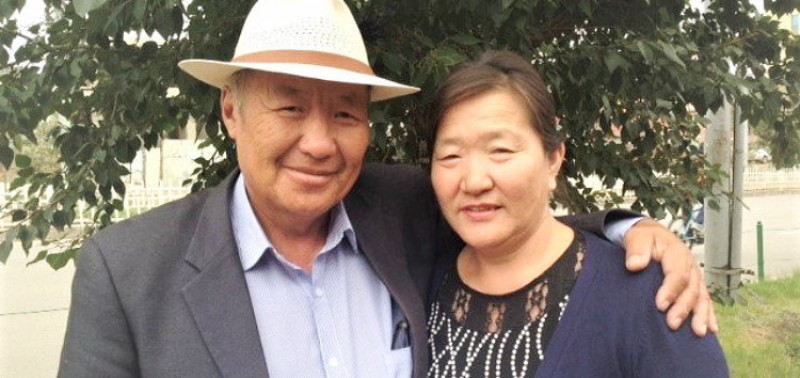Gospel hope transforms lives of addicted couple
Mongolia in Pacific Asia

“My name is Altantsetseg,” she says. “I was a bright and lively child who loved to sing and play music. When I was in fifth grade, I told my classmates about another classmate’s secret. Consequently, my classmates stared to call me ‘blabbermouth.’ They jeered at me so much that I began to distance myself from them and kept to myself all the time.
“Of course, I lost my friends too. They also made fun of my looks and the color of my eyes,” says Altantsetseg. “I felt so ashamed that I dared not look at others directly. When I finished high school, I married a guy from my home town. The initial two years were blissful, but in the third year of our marriage, my husband started to drink and gamble.
“Whatever we had – house, flock and valuables – were gambled off. His winnings could not recover the losses. Whenever my husband lost the gamble, he would drink, fly into rages, and break all that he could break in the house.
“Even though he had chased me out of the house in the middle of the night with only the clothes on my back on numerous occasions in summer and winter, I tolerated his behaviour because I thought he was just frustrated and envious of another person’s winning. One thing that I found intolerable, though, was the way he heaped abusive words on me."
“We quarrelled a lot,” says Altantsetseg. “One way I coped with all that was to indulge in sweet food and shopping if I had money, or window shopping if I had no money. This went on for more than twenty years, and then I became fed up with my life. At a time when I thought it was better to die, and when I had made plans to commit suicide, I came to know the Lord.
“In fact, God found me and saved me; as well as my family. Shortly after I came to the Lord, my husband and I learned about the Celebrate Recovery programme from a friend, and we decided to attend,” she says. “At first, I thought only my husband needed to change. Soon, I realised I needed to change too. Participating in the support group was a challenge because I had difficulty expressing myself or simply to look directly at others.
“Nonetheless, I acknowledged that I was co-dependent and addicted to shopping, sweet food, even to squabbling, and I started to work through the twelve steps for recovery. Gradually, my husband and I saw changes in our lives. I am very thankful that God renewed our relationship and restored peace in our family.”
Now Altantsetseg says her husband is a leader in church, and both of them are planning to start a sister church in our neighbourhood soon.
“It has been 10 years since I joined the Celebrate Recovery programme in our church,” she says.
She now serves joyfully at the Celebrate Recovery ministry and volunteers as a para-counselor in the ministry, which is now called Transformation TRACC (Training and Counselling Centre for Addiction and Recovery).
“I want to share the joy and happiness God has given me with women who are experiencing what I went through, and tell them that there is hope. I thank God that he is using my experience for his kingdom,” says Altantsetseg. “All glory be to God!”
Pray for:
• couples like Altantsetseg and her husband who are or have been trapped in abuse or addiction in Mongolia.
• ministries like TRACC who reach out to them with the love of Christ.
• a great harvest among these hurting people in Mongolia.
If you're interested in giving to programs that work with addicts or serving among the people of Mongolia, contact SIM today.
Related stories

Evangelism: The foundation of missions
Dr. Stanley Ling shares his thoughts on evangelism and its role in mission work.

SIM missionary forerunner called home
It is fitting that Andrew finished his missionary career in a similar fashion to how he began it, as a pioneer of new ministry ventures for SIM, empowering people to serve in those least-reached places of the world where people are living and dying without knowing Christ.

